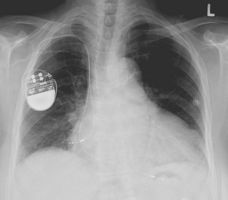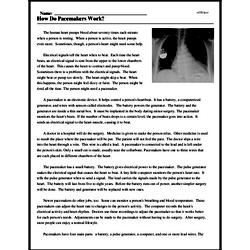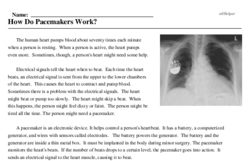How Do Pacemakers Work?
The human heart pumps blood about seventy times each minute when a person is resting. When a person is active, the heart pumps even more. Sometimes, though, a person's heart might need some help.
Electrical signals tell the heart when to beat. Each time the heart beats, an electrical signal is sent from the upper to the lower chambers of the heart. This causes the heart to contract and pump blood. Sometimes there is a problem with the electrical signals. The heart might beat or pump too slowly. The heart might skip a beat. When this happens, the person might feel dizzy or faint. The person might be tired all the time. The person might need a pacemaker.
A pacemaker is an electronic device. It helps control a person's heartbeat. It has a battery, a computerized generator, and wires with sensors called electrodes. The battery powers the generator. The battery and the generator are inside a thin metal box. It must be implanted in the body during minor surgery. The pacemaker monitors the heart's beats. If the number of beats drops to a certain level, the pacemaker goes into action. It sends an electrical signal to the heart muscle, causing it to beat.




